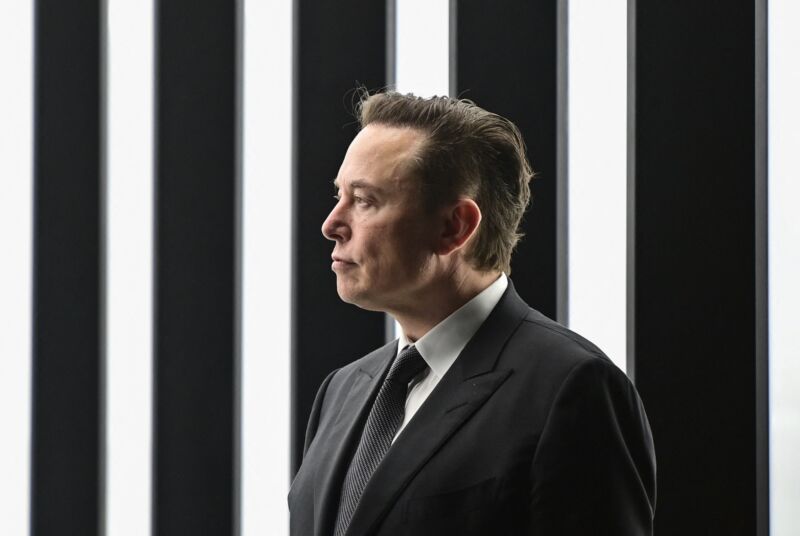Elon Musk buys 9% of Twitter stock as he pressures company on “free speech”

Elon Musk has purchased 9.2 percent of Twitter’s stock, he revealed in a Securities and Exchange Commission filing on Monday. The Tesla and SpaceX CEO bought 73,486,938 Twitter shares on March 14, the filing said.
Musk’s stake was worth $2.89 billion, based on Twitter’s closing price on Friday, and “appears to make Mr. Musk Twitter’s largest shareholder,” The New York Times wrote. Musk’s “holding is slightly larger than Vanguard’s 8.8 percent at the end of last year, and it dwarfs the 2.3 percent stake of Jack Dorsey, Twitter’s former chief executive.”
Twitter’s stock price was up over 28 percent Monday as of this writing. Based on today’s rise, Musk “has made about $1.1 billion on his holding since mid-March,” Bloomberg wrote.
Musk could use his ownership stake to influence Twitter’s business plan or its policies. Bloomberg wrote that “Twitter is particularly vulnerable to outside pressure because unlike Google, Facebook, Amazon, and Snap, the company’s founders don’t have special voting control over its future. The company has just recovered from activist pressure by Elliot Management that started in 2020 which led Dorsey, who was serving his second stint as CEO of Twitter, to set a succession plan.”
Musk scrutinized Twitter over “free speech”
Musk is a prolific Twitter user who often posts company news on the platform and has fought with the SEC over a 2018 settlement that requires Tesla to impose controls on his social media statements.
On March 25, Musk posted a Twitter poll, writing, “Free speech is essential to a functioning democracy. Do you believe Twitter rigorously adheres to this principle?”
Musk added in a follow-up tweet, “The consequences of this poll will be important. Please vote carefully.” Musk’s poll received over 2 million votes, with over 70 percent answering “no.”
A day after the poll, Musk wrote, “Given that Twitter serves as the de facto public town square, failing to adhere to free speech principles fundamentally undermines democracy. What should be done? Is a new platform needed?” Musk also polled users on whether the “Twitter algorithm should be open source,” and he claimed to be “giving serious thought” to building a new social media platform.
Musk recently called himself a “free speech absolutist,” after which an Insider article noted that he “has a track record of silencing critics with threats of lawsuits and firing employees who disagree with him.” Musk “is a free speech absolutist… unless it involves safety concerns IMO,” wrote ex-Tesla employee John Bernal, who says he was fired for posting YouTube videos about Tesla’s Full Self-Driving beta.
“All-out buyout should not be ruled out”
Financial analysts said that Musk’s stock purchase could signal an attempt to influence Twitter’s leadership. “We would expect this passive stake as just the start of broader conversations with the Twitter board/management that could ultimately lead to an active stake and a potential more aggressive ownership role of Twitter,” Dan Ives of Wedbush Securities wrote in a client note, according to NPR.
CFRA Research analyst Angelo Zino wrote that “Musk’s actual investment is a very small percentage of his wealth, and an all-out buyout should not be ruled out,” according to Reuters. Reuters also quoted Thomas Hayes, managing member at Great Hill Capital, as saying that Musk’s purchase “does send a message to Twitter… having a meaningful stake in the company will keep them on their toes because that passive stake could very quickly become an active stake.”
https://arstechnica.com/?p=1845637